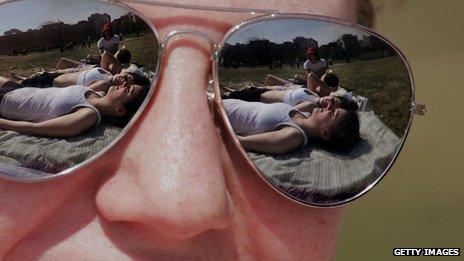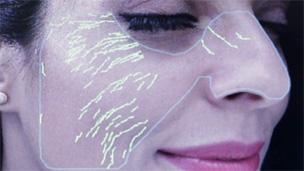Healthy lifestyle and the science of good skin care
- Published

Sun protection is one of the main issues in good skin care
Looking younger for longer is a popular obsession but what's the scientific truth about younger looking skin, asks plastic surgeon Dr Rozina Ali.
Plastic surgeons are not exempt from ageing or the concerns of ageing. We really are all in this together.
But I was in for a nasty surprise recently when I agreed to be photographed using a camera which reveals the underlying but as yet unseen wrinkles developing in the skin.
I love the warmth and soporific feel of the sun on my face through the car window when I'm driving, but the test clearly showed the effects of accumulated hours of driving.
There was significantly more damage to the skin on the right side of my face from the many extra hours of extra exposure to sunlight.

More fine wrinkles were detected on the right hand side of Dr Rozina Ali's face
I had sort of suspected it. I just hadn't realised the damage would be that marked.
I use sun cream with full UVA and full UVB protection.
The UVB radiation is what causes sunburn, but protection from UVA radiation is also important. UVA radiation penetrates deeper, damaging our DNA and causing the release of an enzyme, which degrades the collagen that gives skin its elastic quality.
I've been vigilant about sun protection for the past several years now. I may have learnt late, but I have learnt and I'll keep up the effort - It's absolutely worth it!
Perceived age
People often say how young I look, but most of it I dismiss as wind and smoke, or I attribute it to my genes and make-up, or simply my generally playful attitude.
But a second test I underwent was superbly flattering, by seriously underestimating my age based on the appearance of my skin, as well as identifying one contributory factor, again in our diet.
A panel were asked to guess my age, but only my facial skin was visible and my eyes were closed to prevent any personality peeping out.
I was initially a bit put out that the judgement would be made by non-experts, but the number of people used to review the age of the test subject is so large that it evens out variations and they do get quite a good estimate.
The test was developed to investigate the link between sugar in our diet and perceived age. My blood sugar level was low which was consistent with a younger appearance.
People with higher blood sugar tend to look older on average, with diabetics looking older still, according to the findings.
This is attributed to the damage sugar can do to the collagen in our skin whose function deteriorates as we get older.
"Once it gets attached to collagen, it makes the collagen brittle and more likely to break and it is also more difficult for the skin to repair itself," says Dr David Gunn, senior scientist at Unilever.
There is a whole new exciting science called glycobiology which looks at lipids and sugars and their role in our bodies that is only now being developed.
It promises to shed light on the differences between young skin and ageing skin, in particular the role of glycans in repairing damaged skin.
The cosmetics industry is becoming more closely allied with science and pharmaceuticals - but I'll be honest. As a woman I don't expect many things I buy across the counter to actually live up to their promises! It's mostly about the packaging, the smell, the luxurious brand you want to be linked with.
To actually have products that work too would be a great step forward.
Healthy living
Of course we none of us last forever, but if we can be as healthy as possible, our skin is a marker of general health - the state of our lungs, heart cardiovascular system, bowels, etc.
As for my own profession, of course, it's true, plastic surgery can alter appearance, often radically. And yes, I can do things that nature didn't intend -- but only to the extent that the patient can accept scars, down-time, and other factors.
There are also additional non-surgical methods of rejuvenation including skin tightening procedures, replenishing reserves of glycans (fillers), paralyzing muscles which cause unwanted wrinkles (Botox), and prescription medication to improve skin quality.
Ravages of time
But as a surgeon, I'm not at all about camouflage and cover-up, I'm about health and well-being. If it happens to make you look better or younger - that's a bonus.
I always advise that ageing, maturing, living is a multi-dimensional process. It takes time.
It would be naïve to think that undoing its ravages can be about a quick-fix or one-off approach.
That's why I promote discipline and personal responsibility, and for people doing things for themselves - eating less, eating better, exercising moderately, sleeping heartily, reducing stress, getting a sensible work-life balance, doing things which are personally fulfilling.
That is health and a life well-lived. Looking good but being unhealthy or unhappy isn't.
Any hopes of slowing or reversing processes involved with ageing depends on understanding them and that requires the rigorous research and testing of medical science.
Science and hope go together in medicine, that's why I love it.
Dr Rozina Ali presents <link> <caption>Horizon: The Truth About Looking Young</caption> <url href="http://www.bbc.co.uk/programmes/b01lbgrp" platform="highweb"/> </link> on BBC Two at 21:00 BST on Mon 23 July. Watch online afterwards (UK only) or watch clips at the above link.